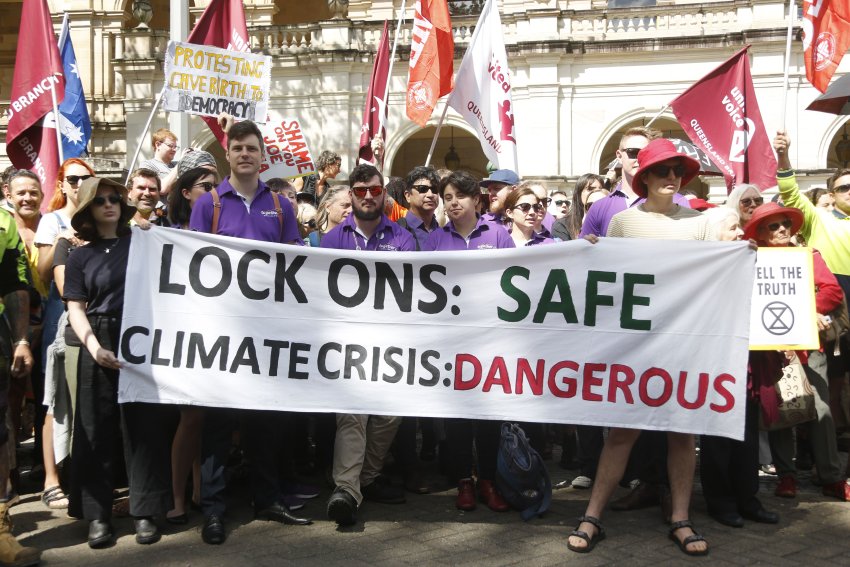
Environmental group Frontline Action on Coal (FLAC) has denounced anti-protester laws passed by Queensland parliament as deceitful, overreaching and ultimately destined to fail in its intent to stop people protesting.
The Dangerous Attachment Devices Bill, which specifically bans the use of lock-on devices used by protesters to attach themselves to buildings and vehicles, was passed on October 24 by 86 votes to 1.
Meanwhile, Brisbane City Council (BCC) voted on October 15 to ban climate action group Extinction Rebellion (XR) from using council facilities, such as libraries, to meet.
XR members responded by gathering at Brisbane City Library on October 19 for a “Read In” to defy the ban, while hundreds attended a Protect the Right to Peaceful Protest rally held in Brisbane on October 22.
The moves follow XR’s recent Spring Rebellion week of non-violent civil disobedience, during which several disruptive actions were held in Brisbane, in some cases leading to arrests. Queensland has become an important battleground for environmental protest groups such as FLAC and XR, after the state Labor government gave Indian mining giant Adani the final go ahead for its mega coal mine in the Galilee Basin earlier this year.
FLAC spokesperson Andy Paine warned: “The government has bypassed normal parliamentary procedures and resorted to spreading baseless accusations to pass a law that is specifically aimed at restricting political protest. Every single Queenslander should be concerned about the threats to democracy implicit in those actions…
“First of all because they are based on a lie — the false claims that devices are ‘laced with dangerous traps’ intended to injure police officers. This claim was a key part of the rationale for this law but has never been backed up by evidence.
“The committee process was a joke, with hearings rushed and witnesses given little to no time to prepare. Evidence was submitted by police without labels, dates or locations, and with no opportunity for other groups to speak after them and challenge the claims.
“Most of the submissions, including by human rights and law experts, opposed the bill, yet the committee recommended the laws be passed in full.”
Librarian Katya Henry said: “Libraries have always been spaces where the free flow of information and ideas is welcomed. The BCC gag on XR meetings sets a dangerous precedent for freedom of speech and the right to peaceful protest."
The Australian Library and Information Association has condemned the ban. In an October 17 statement, ALIA said it “supports freedom of speech, freedom of expression and the freedom to engage in peaceful protest. We stand for social justice, and that libraries are public spaces where community groups can come together to discuss major social issues, provided their activities are lawful.
“The strength of our democracy relies on non-violent groups being able to meet and discuss critical issues of the day."
Paine concluded: “Ultimately, these laws will not stop people taking direct action against the actual threat to safety which is climate breakdown.
“Civil disobedience has a long and proud history in Australia and around the world of enacting positive social change and protecting our environment. Right now, facing a climate crisis that governments have proven unable or unwilling to stop, we need courageous and creative citizen political engagement more than ever.
“If [Premier] Annastacia Palaszczuk thinks repressive laws will be enough to stop people of conscience taking action for our climate, she is going to be disappointed.”